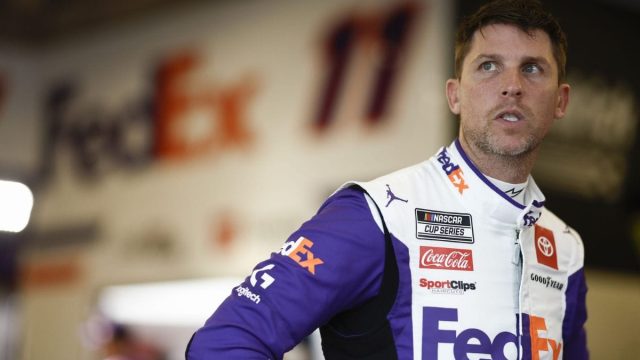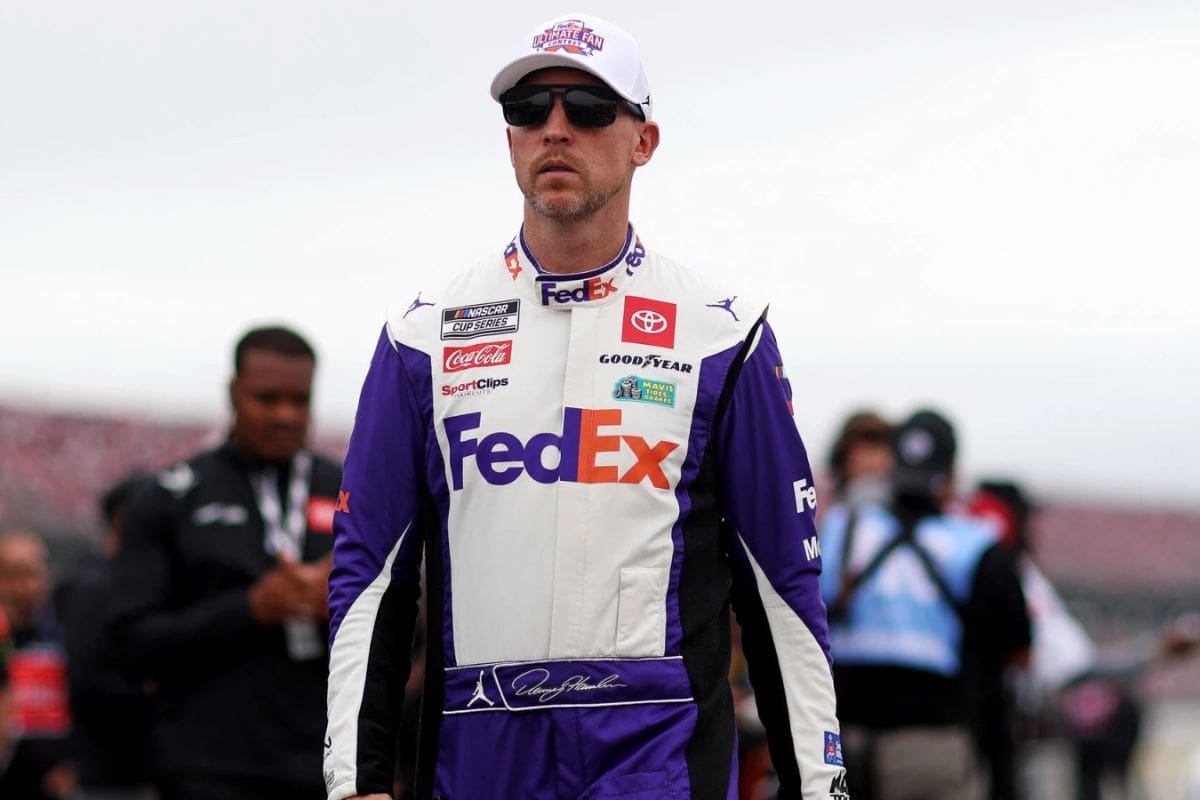Denny Hamlin and NASCAR’s Controversy at Indianapolis: Denny Hamlin‘s recent criticisms directed at NASCAR’s fuel strategy rules during the Indianapolis race have ignited a significant conversation about equity in competitive racing. He argues that late-race fuel top-offs disproportionately favor lower-ranked drivers, forcing those in the race to compromise their racing strategies for mere fuel conservation. This development not only alters the dynamics of competition but also raises questions about the sport’s integrity and its appeal to fans. As Hamlin demands a re-evaluation of these rules, the broader implications for the future of NASCAR warrant careful consideration.
Key Highlights
- Denny Hamlin expressed frustration over NASCAR’s fuel strategy rules, highlighting their impact on race integrity during the Indianapolis event.
- He criticized late-race fuel top-offs, which allow slower drivers to gain advantages over front-runners forced to conserve fuel.
- Hamlin noted that unpredictable fuel economy strategies significantly alter race dynamics, making outcomes less dependent on driver skill.
- The current Gen 7 car design contributes to reduced passing opportunities, leading to single-file racing and diminished fan engagement.
Fuel Mileage Racing Controversies
Fuel mileage racing has emerged as a controversial issue within NASCAR, raising concerns about its impact on race dynamics and fan engagement. The intricacies of fuel strategy have transformed racing, often leading to a style of competition that prioritizes fuel conservation over aggressive driving.
While this strategy highlights driver performance regarding fuel management and tire management, it has also drawn criticism for diminishing the excitement that defines NASCAR events.
As seen in recent races, including the 2024 Brickyard 400, teams frequently grapple with fuel efficiency dilemmas, complicating the racing narrative. Drivers like Bubba Wallace and Brad Keselowski found themselves involved in fuel-saving tactics, which ultimately extended race finishes and altered their racing styles.
This shift has raised questions about the authenticity of competition when teams must strategically throttle down to conserve fuel, rather than fully engaging in high-speed racing. Furthermore, the implications for fan engagement are significant; spectators may become disenchanted by a perceived lack of action, detracting from the natural thrill of racing.
Denny Hamlin’s Views on Fuel Economy
In consideration of the recent controversies surrounding fuel mileage racing, Denny Hamlin’s podcast remarks show the unpredictable nature of fuel economy strategies, particularly following his experience at the Brickyard 400. His insights articulate the risky balance drivers must handle between calculated fuel management and the whims of race dynamics.
Hamlin emphasized how a single caution lap can drastically alter a driver’s fuel strategy, turning a well-planned race into a scramble for fuel conservation. He stated, “You’re one caution away from this thing going just as planned, and then we got one caution.” This highlights the inherent uncertainty drivers face, where racing strategies must adapt to evolving circumstances, often dictated by the race itself rather than preparation.
“But then the second one was like, now that puts us in a weird fuel window where we’re short. So we’re going to have to save.” – (hamlin)
The Brickyard 400 displayed this unpredictability, as evidenced by Brad Keselowski’s misfortune with an unexpected additional overtime and subsequent fuel shortage. Such driver experiences highlight the complexity involved in optimizing fuel economy amid fluctuating race conditions.
Hamlin Criticizes NASCAR’s Fuel Strategy Rules
Denny Hamlin has voiced strong concerns regarding NASCAR’s fuel strategy rules, arguing that they create an uneven playing field that detracts from the essence of competitive racing. He pointed out that drivers, particularly those who find themselves in the back of the pack, can exploit these rules to gain an advantage, as seen with the #5 car that benefited from a late-race fuel top-off. This situation forced front-runners like Hamlin to conserve fuel, resulting in a frustrating dynamic where full-throttle racing was replaced by fuel mileage tactics.
“But others that were in the back of the pack like the #5 because he had his issue with 90 to go or something like that. He had fuel. So he then just kind of topped off and then it just, it f***** everything up. It really did. And so we spent the whole last run having to save. And so it’s frustrating because it was very similar to like the superspeedway races that we have had all year.” – (hamlin)
Hamlin lamented the growing prevalence of these fuel strategy scenarios, stating, “If the race is 160 laps… I think I ran hard 25 of those laps. So it’s just I’m so tired of running fuel mileage races where we’re all running half-throttle.” His critique highlights a crucial issue: the NASCAR rules appear to compromise racing fairness and competitive balance.
“I wish we could do something about it. But it’s like, I don’t know it it helps you sometimes, it hurts you sometimes. But I just think for the racing’s sake man, do we really want NBC to have to sit here and explain all these different things and fuel and all? It’s like don’t you just want to see us out there racing…? Well, he’s doing a great job explaining what’s happening, but can we stop that from happening somehow where it’s like fuel mileage races?” – (hamlin)
Issues with Modern NASCAR Racing
Modern NASCAR racing faces significant challenges, as the limitations of the Gen 7 car worsen existing issues related to competitive dynamics and fan engagement. The design has led to notable passing difficulties, with drivers often finding themselves in a single-file line, focused on fuel conservation rather than competitive overtaking. This has diminished race excitement, with many events devolving into fuel-mileage strategies rather than showing true car performance.
“You couldn’t pass. You’re all just running in a line there saving fuel, like a speedway race. We were just doing everything to get to the finish and didn’t make it.” – (hamlin)
The impact on track position has been profound; a driver’s ability to gain positions often depends on external factors rather than skillful driving. This has led to frustration among fans, who expect thrilling battles on the track.
Proposed Strategies to Revive NASCAR Racing
Numerous potential solutions have emerged as NASCAR seeks to address its current challenges, prompting a range of reactions from fans enthusiastic for change. The need for strategic changes is evident, particularly in areas that directly influence fan engagement and driver performance.
Implementing a more dynamic race format, possibly reducing stage lengths or introducing more variable pit strategies, could lead to increased excitement and unpredictability during races.
Actively soliciting and incorporating driver feedback into rule adjustments could guarantee that the racing experience is not only competitive but also aligned with the drivers’ insights on track dynamics.
Introducing mandatory pit windows may create more strategic depth in races, allowing teams to plan effectively and improving the comprehensive spectacle for fans.
News in Brief: Denny Hamlin and NASCAR’s Controversy at Indianapolis
The discussion highlights the controversial issue of fuel mileage racing in NASCAR, where strategic fuel conservation often overshadows aggressive driving, impacting race dynamics and fan engagement. Recent races, like the 2024 Brickyard 400, showed the challenges and criticisms surrounding these tactics.
Denny Hamlin and others have criticized the rules, arguing they create an uneven competitive field. Proposed solutions include revising race formats, integrating driver feedback into rule adjustments, and establishing permanent pit windows to enhance race excitement and strategic depth. These changes aim to address fan dissatisfaction and restore the thrill of competitive NASCAR racing.
ALSO READ: Denny Hamlin’s Crew Chief Disappointed at IMS After Crushing Brickyard 400 Defeat



